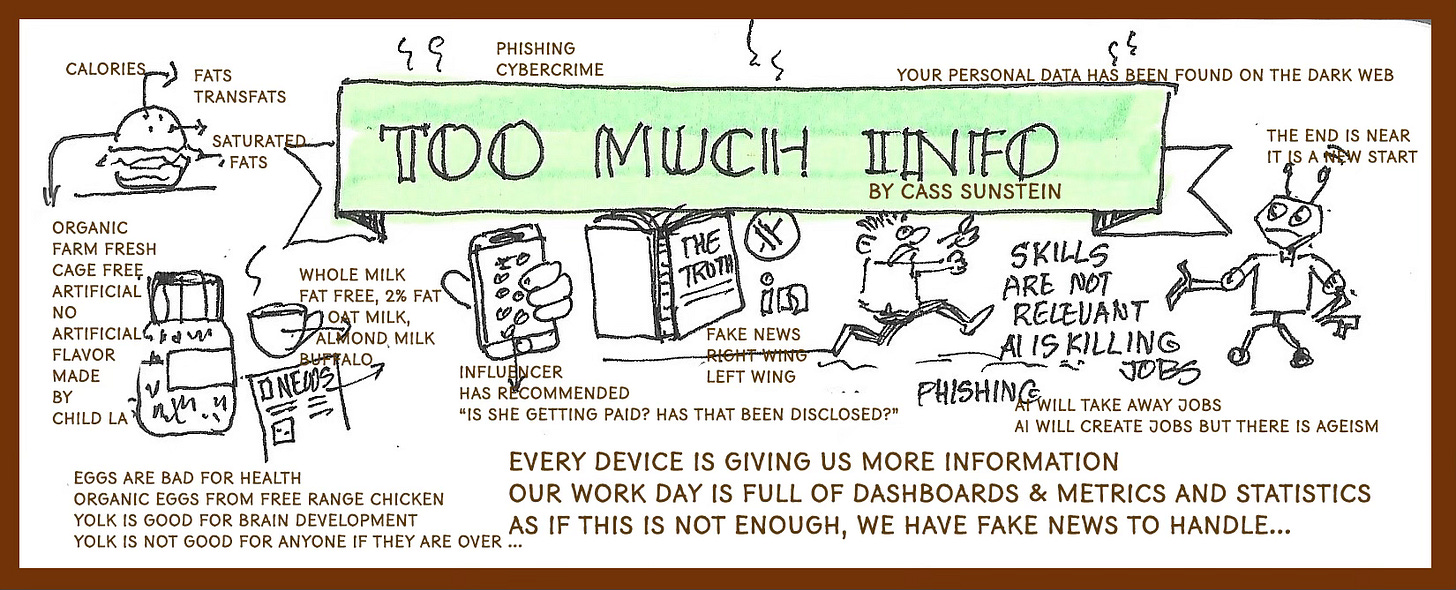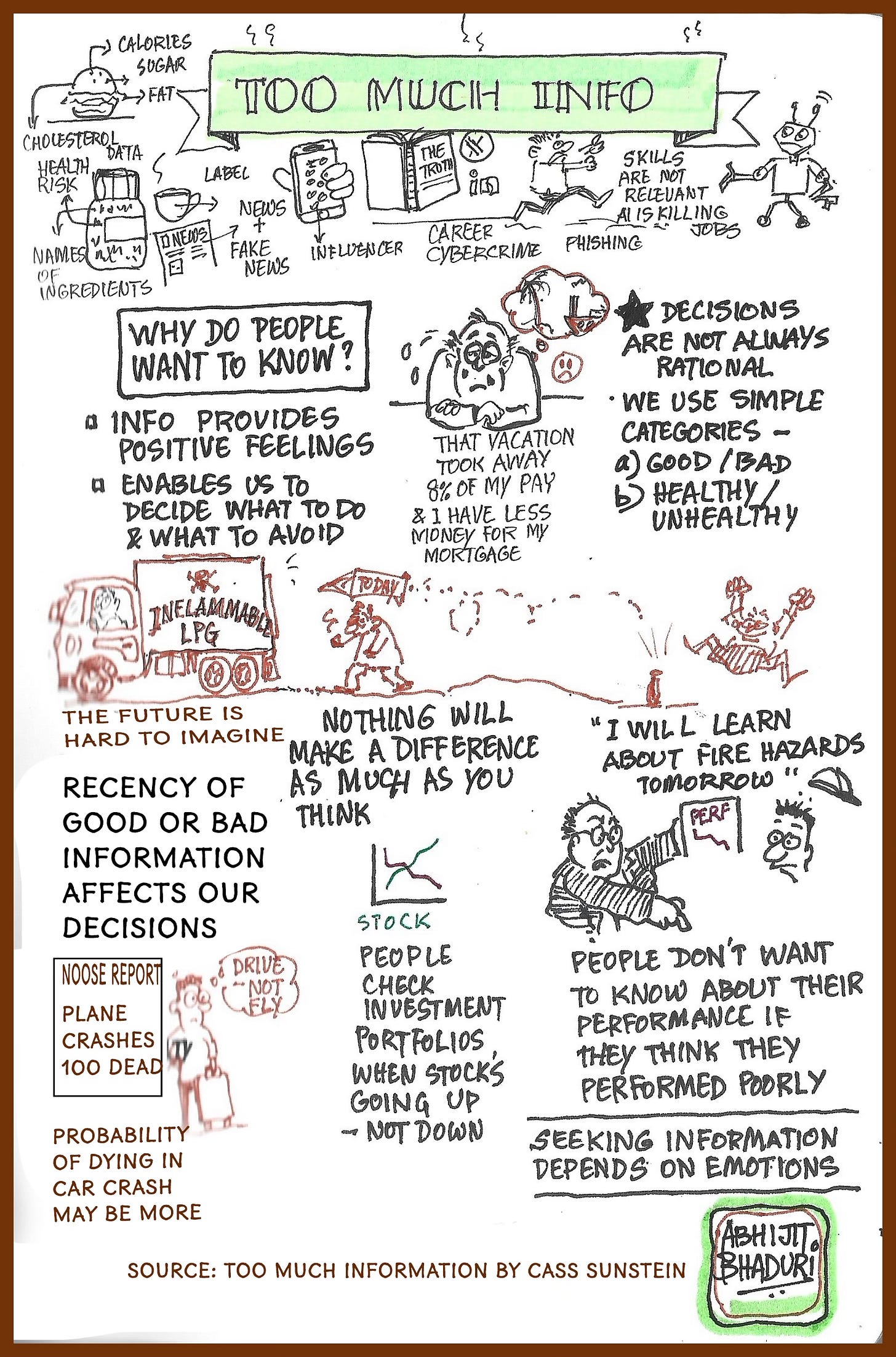Dashboard, Disclosures and Despair
We often confuse the abundance of information with the clarity of knowledge. Cass Sunstein's book Too Much Information was a terrific read. My review and how to use it in the workplace.
Have you ever felt like you’re drowning in a sea of information, but not sure if it’s actually helping you make better decisions. This is just the book you should read.
Every Monday morning, I get a flood of dashboards in my inbox. There’s one from HR showing attrition risk, one from Finance on budget utilisation, and one from Learning & Development summarising course completions. And on top of that, Slack is constantly pinging me with updates on employee engagement scores, the new travel policy, and the company’s quarterly carbon footprint report.
It’s like there’s data everywhere, but no real insight. We often confuse the abundance of information with the clarity of knowledge. We think if we just share more metrics, disclosures, benchmarks, and scores, people will be empowered to act. But here’s the uncomfortable truth: not all information is helpful. Some of it confuses us, some of it overwhelms us, and some of it quietly makes things worse.
Cass Sunstein’s book “Too Much Information” really puts this dilemma into perspective. He argues that information should not be shared for its own sake. It should only be shared when it improves lives or helps people make better decisions.
People often don’t want more information—they want better information. Sometimes, knowing less improves happiness and decision-making.
Use this to improve the Employee Experience
Talent Management is often guilty overwhelming us with data, dashboards and not enough insights. Here are a few ideas on how to use it to improve talent management.
Idea: Ask, “What emotions will it generate?”
Don’t bombard employees with dashboards, benchmarks, and policy updates. But do they help anyone decide or feel better? Instead of overloading managers with turnover risk data, focus on contextual conversations. Show what matters—and explain why it matters now. Prioritize quality over quantity in talent metrics. Do you agree?
⸻
Idea: Inform only when outcomes will improve
Before publishing engagement or performance data, ask: will it change behavior or just trigger defensiveness? Mandate information internally only when it leads to clearer choices, better outcomes, or a tangible improvement in well-being. If not, reconsider or redesign the message.
⸻
Idea: Make feedback feel psychologically safe
Employees often fear feedback not because of the content but because of how it feels. Ease them into reviews or diagnostics by framing them as growth tools, not judgments. Let people know how you’ll support them after the feedback lands.
⸻
Idea: Clarity beats completeness every single time
Your talent frameworks may be technically sound, but are they human-friendly? Simplify compensation grids, promotion paths, and career architecture. Use plain language, stories, and visual cues to make complex policies navigable and useful.
⸻
Idea: Disclose ethics with care and context
Publishing sensitive data like DEI scores or pay equity gaps needs context. Without support, disclosures can cause confusion, guilt, or performative action. Facilitate conversations that allow people to absorb and respond meaningfully to moral data. Think about what that information will make each employee feel. Do you agree that some information needs to be explained, and not just dumped on the employees.
⸻
Idea: More updates ≠ more engagement or trust
Don’t equate transparency with over-communication. Employees may want clarity more than constant access. Choose fewer, clearer updates. Share decision-relevant information instead of flooding inboxes with activity that feels performative or distracting.
⸻
Idea: Cut bureaucratic sludge from HR processes
Audition your own forms. Are internal job applications, promotion processes, or course registrations riddled with friction? Sludge hurts equity. Remove needless steps, simplify workflows, and reduce approvals so people can focus on their development—not your system.







Thanks for sharing the book. I love books, and book-lovers :-)
Found it here and will add on my reading wishlist:
https://www.amazon.in/Too-Much-Information-Understanding-What/dp/0262543915